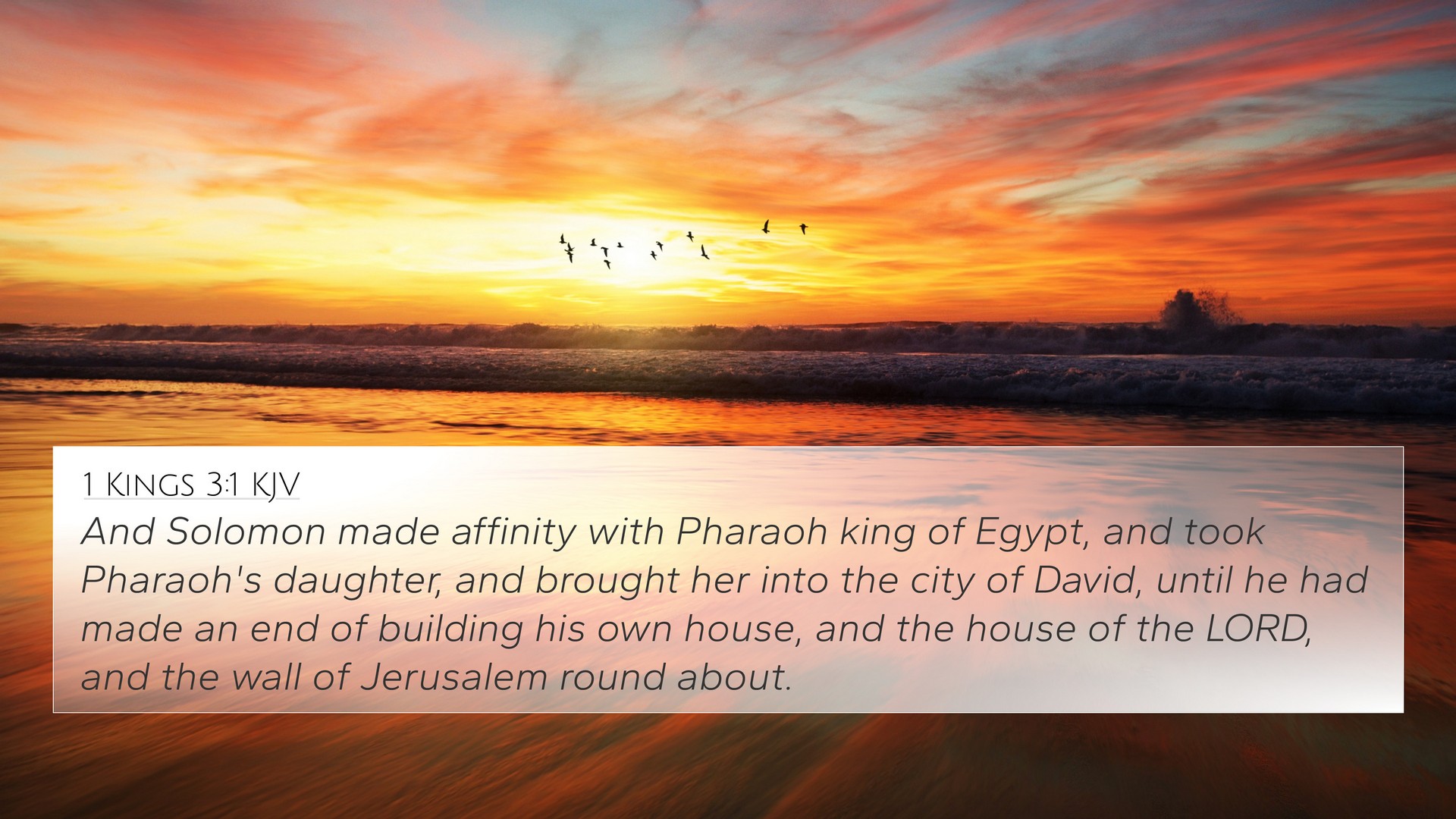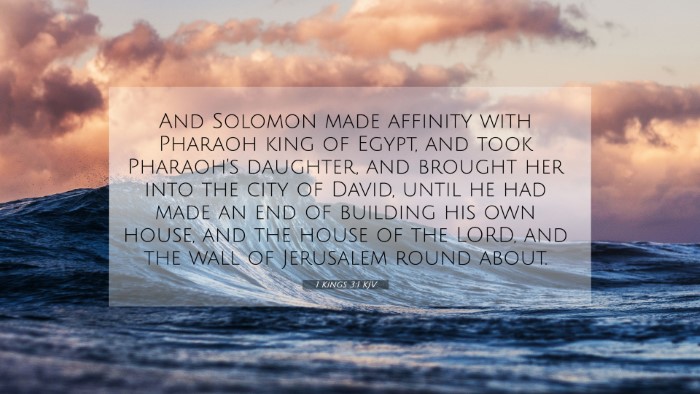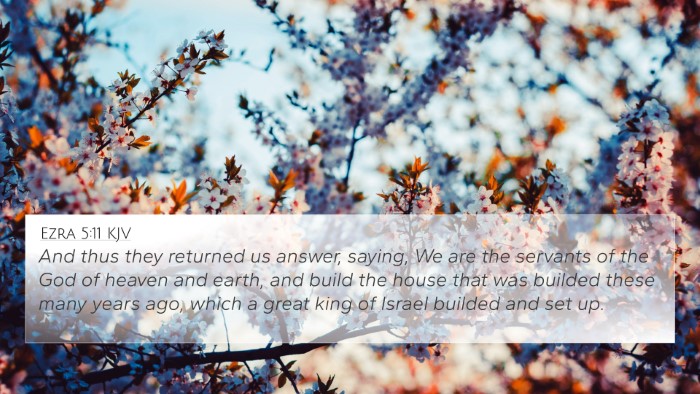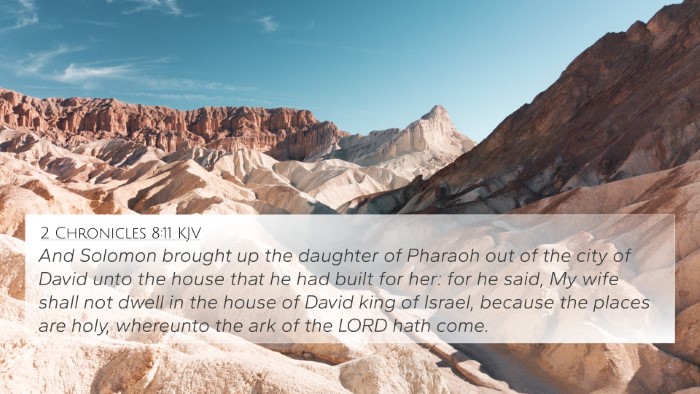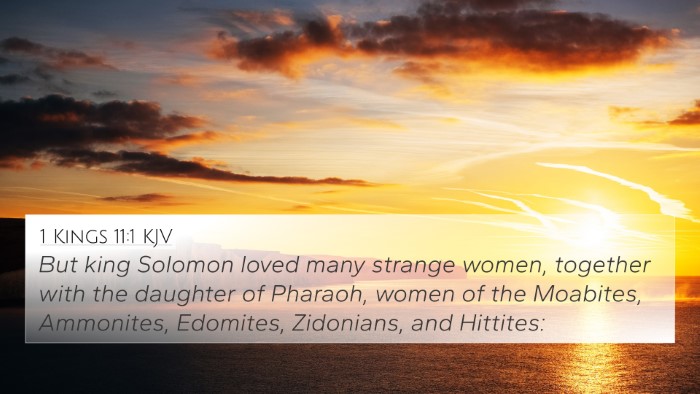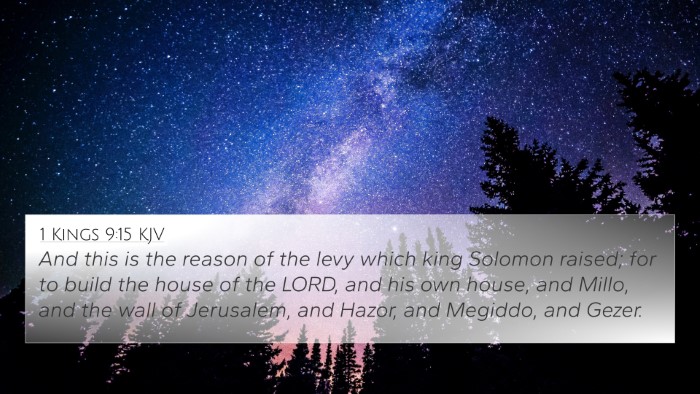Understanding 1 Kings 3:1
1 Kings 3:1 states: "And Solomon made affinity with Pharaoh king of Egypt, and took Pharaoh's daughter, and brought her into the city of David, until he had made an end of building his own house, and the house of the Lord, and the wall of Jerusalem round about."
Summary and Interpretation
This verse introduces the beginning of Solomon's reign and highlights significant political alliances formed through marriage. The act of marrying Pharaoh's daughter symbolizes Solomon's desire to strengthen Israel's political standing and further solidify the kingdom's stability.
Commentatorial Insights
-
Matthew Henry:
Henry emphasizes the pragmatic approach Solomon takes in securing alliances with foreign powers, signifying wisdom in recognizing the importance of diplomacy. He also notes the need for Solomon to focus on building the temple as a priority, indicating a spiritual aspect to his leadership.
-
Albert Barnes:
Barnes focuses on the historical context of Solomon's marriage, interpreting it as a way to secure peace. He discusses how such alliances were common in the ancient world and stresses the necessity of wisdom in governance, which Solomon later demonstrates in his famous judgment.
-
Adam Clarke:
Clarke deepens the exploration of the verse by discussing the cultural implications of marrying a foreign princess. He notes that the continued building efforts reflect God's covenant with David to establish a lasting kingdom, while also hinting at the potential dangers posed by such alliances.
Thematic Bible Verse Connections
The connections between scripture reveal much regarding cross-referencing biblical texts. Here are some relevant verses to consider:
- Exodus 34:16: "And thou take of their daughters unto thy sons, and their daughters go a whoring after their gods, and make thy sons go a whoring after their gods." — Warning against foreign alliances.
- Deuteronomy 7:3: "Neither shalt thou make marriages with them; thy daughter thou shalt not give unto his son, nor his daughter shalt thou take unto thy son." — Highlights the potential pitfalls of intermarriage.
- 1 Kings 11:1-2: "But king Solomon loved many strange women... of the nations concerning which the Lord said unto the children of Israel, Ye shall not go in to them..." — Discusses the consequences of Solomon's later marriages.
- 2 Chronicles 1:7-10: "In that night did God appear unto Solomon, and said unto him, Ask what I shall give thee." — Connects to the wisdom Solomon eventually seeks.
- Psalm 72:1-2: "Give the king thy judgments, O God, and thy righteousness unto the king's son." — A prayer for kingly wisdom and justice.
- 1 Chronicles 22:5: "And David said, Solomon my son is young and tender, and the house that is to be built for the Lord must be exceeding magnifical..." — Refers to the temple's importance.
- 1 Kings 8:17-19: "And it was in the heart of David my father to build a house for the name of the Lord God of Israel. And the Lord said unto David, Forasmuch as it was in thy heart to build a house unto my name, thou didst well that it was in thine heart." — Continuation of the building theme established by David.
Cross-Referencing Biblical Texts
The use of a bible concordance or bible cross-reference guide can greatly assist in understanding how these verses interlink with the stories of Solomon and the themes of wisdom, leadership, and divine guidance. Engaging in cross-reference Bible study helps to illuminate the broader narrative within scripture.
Conclusion
1 Kings 3:1 serves as a critical beginning point in understanding King Solomon's reign, illustrating the balance between political wisdom and adherence to God's covenant. Thus, it invites readers to explore deeper thematic connections throughout the Bible and highlights the importance of maintaining spiritual integrity while engaging in worldly matters.
